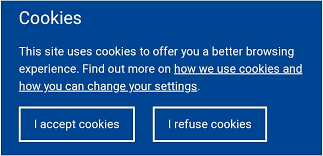Is Privacy a Myth in the Digital Age?

Is Privacy a Myth?
"If you have nothing to hide, you have nothing to fear."
It’s a phrase we’ve all heard, often used to justify surveillance or careless data collection But in today’s world, where our lives unfold through screens and servers that statement feels hollow. Privacy, once something we could control, has become a luxury few can claim. With every tap, click, or scroll, we leave traces of ourselves scattered across the digital universe. So, the real question is: does privacy still exist or is it just an illusion we’re clinging to?

Accepting Cookies: The Sweet Trap of the Internet
Every time we visit a website, a familiar pop-up appears “This site uses cookies. Accept all?” Most people click “Accept” without thinking twice, eager to move on But that single click often opens the door to one of the biggest privacy leaks on the internet.
Cookies are tiny files that websites store on your device to remember your activity. Some are harmless, they keep you logged in or save items in your shopping cart But others, called tracking cookies, monitor what you do across multiple websites. They record what you read, buy or even hover over, building a detailed profile of your online behavior. This data can then be shared with advertisers, data brokers or third parties you’ve never heard of. According to cookiescript Third-party cookies are cookies that are tracked by websites other than the one you are visiting.
What makes this practice concerning is how invisible it feels. People often assume cookies are necessary for a site to work, when in reality, many cookies simply exist to collect marketing data. The “Accept All” button is designed to be bright and easy to click, while the “Manage Settings” or “Reject All” option is hidden or complicated to navigate. It’s not really consent, it’s digital persuasion.
In essence, accepting cookies has become the modern handshake of the web, casual, quick, but deeply revealing. Each click gives away a little more of your privacy in exchange for convenience. Awareness is the key here. The next time that pop-up appears, it’s worth pausing to ask Do I really need to accept this? Or am I just giving away another piece of myself for free?
The Digital Footprint You Didn’t Know You Were Leaving
Every action online leaves behind a digital footprint, a breadcrumb trail of your habits, choices, and preferences. From the websites you visit and the apps you install, to the photos you upload, everything builds a data profile about who you are.
Tech companies argue that collecting this data helps “improve user experience.” And in some ways, it does, Netflix learns your taste, Spotify curates your playlists, and Google finishes your sentences but behind the convenience is a trade-off, your personal information becomes a commodity. Every recommendation, every targeted ad and every “personalized” service is powered by data you didn’t know you were giving away.
Even simple actions like allowing location access or signing in with your social media account can reveal more than you expect And deleting an app doesn’t erase the data already gathered, it simply freezes your trail in someone else’s system. In truth, your online identity exists in multiple copies across different databases, most of which you’ll never see.
The most concerning part is that this digital trail isn’t just used for marketing. It can also influence decisions that directly affect your life , from job opportunities to loan approvals. Some companies use automated systems that assess applicants based on digital behavior patterns. That means a post, a tweet, or even your browsing history could silently shape the way institutions see you. What was once private behavior now forms part of your digital reputation,one that’s nearly impossible to erase.
Social Media and the Illusion of Privacy
Social media is where privacy most visibly unravels. It’s easy to believe you’re in control, after all, you choose what to post, right? But every like, share, and comment feeds algorithms that learn your routines, your interests and even your emotional states. These platforms don’t just know what you say, they know how you feel when you say it.
For young people, especially digital natives, the line between public and private has almost disappeared. Sharing personal moments online feels natural but the internet never forgets. Even deleted posts can linger in backups or screenshots. Every story shared adds another layer to a digital version of you, one that employers, advertisers and strangers can study long after you’ve moved on.
And it’s not just what you post. Friends can tag you, share photos of you, or mention you in ways that reveal information you never agreed to share. Privacy isn’t just about what you do online anymore, it’s about what others do with your image and data.
The deeper issue is that social media platforms are designed to reward visibility, not caution. The more you share, the more engagement you get likes, followers, validation. Over time, people begin to trade privacy for popularity without realizing the cost. This constant need for connection can turn private lives into public performances.

The Business of Data: Who’s Watching and Why
If the internet is free, it’s because you are the product. Data is the currency of the digital economy, and tech giants are its wealthiest traders. Every swipe and click contributes to massive databases used to shape advertising, political messaging, and even consumer behavior.Think of how eerily accurate some ads are mentioning something once, and it appears in your feed. That’s not coincidence; that’s the result of continuous tracking. Advanced algorithms predict your needs before you consciously recognize them.
Latest Tech News
Decode Africa's Digital Transformation
From Startups to Fintech Hubs - We Cover It All.
Beyond corporations, data also fuels surveillance. Governments use it to monitor crime, control narratives, and maintain order but often without clear boundaries. While surveillance can have legitimate uses, it raises unsettling ethical questions: who draws the line between protection and intrusion? Data breaches add yet another layer of danger. Each year, millions of users’ personal information passwords, credit card details and even medical records leak online. Victims often find out too late, when the damage has already been done.
To make matters worse, data is often stored in countries with weak privacy laws. Once information leaves your device, it can be transferred across borders, analyzed by unknown parties, and stored indefinitely. This global trade of personal information means that even if you trust one company, the third or fourth party that receives your data may not be so careful. In the wrong hands, that data can be used for identity theft, manipulation, or exploitation and recovering from such exposure can take years.
Can We Protect Ourselves?
While total privacy may be impossible, digital awareness is still power. You can’t control how big tech operates, but you can control how much you give away.Start by using strong passwords, two-factor authentication, and avoiding “sign in with Google/Facebook” shortcuts. Review app permissions regularly, many don’t need constant access to your microphone or location. Use encrypted messaging apps, VPNs, and privacy-oriented browsers like Brave or DuckDuckGo to reduce data exposure.
Develop a mindset of digital responsibility. Before posting, ask: “Would I be okay if this stayed online forever?” Treat every online space as public, even when it seems private.Governments also have a crucial role enforcing data protection laws and holding tech companies accountable. Yet, privacy is not just a legal issue; it’s a cultural one. We must relearn the value of discretion in a world that rewards exposure.
Still, individual effort alone isn’t enough. There’s a growing need for public conversations about how data is handled and who benefits from it. Schools can teach digital literacy from a young age, helping young people understand consent, online safety, and the long-term consequences of oversharing. When society values awareness over impulse, people become more cautious about what they trade away for convenience.
You may also like...
Bundesliga's New Nigerian Star Shines: Ogundu's Explosive Augsburg Debut!

Nigerian players experienced a weekend of mixed results in the German Bundesliga's 23rd match day. Uchenna Ogundu enjoye...
Capello Unleashes Juventus' Secret Weapon Against Osimhen in UCL Showdown!

Juventus faces an uphill battle against Galatasaray in the UEFA Champions League Round of 16 second leg, needing to over...
Berlinale Shocker: 'Yellow Letters' Takes Golden Bear, 'AnyMart' Director Debuts!

The Berlin Film Festival honored
Shocking Trend: Sudan's 'Lion Cubs' – Child Soldiers Going Viral on TikTok

A joint investigation reveals that child soldiers, dubbed 'lion cubs,' have become viral sensations on TikTok and other ...
Gregory Maqoma's 'Genesis': A Powerful Artistic Call for Healing in South Africa

Gregory Maqoma's new dance-opera, "Genesis: The Beginning and End of Time," has premiered in Cape Town, offering a capti...
Massive Rivian 2026.03 Update Boosts R1 Performance and Utility!

Rivian's latest software update, 2026.03, brings substantial enhancements to its R1S SUV and R1T pickup, broadening perf...
Bitcoin's Dire 29% Drop: VanEck Signals Seller Exhaustion Amid Market Carnage!

Bitcoin has suffered a sharp 29% price drop, but a VanEck report suggests seller exhaustion and a potential market botto...
Crypto Titans Shake-Up: Ripple & Deutsche Bank Partner, XRP Dips, CZ's UAE Bitcoin Mining Role Revealed!

Deutsche Bank is set to adopt Ripple's technology for faster, cheaper cross-border payments, marking a significant insti...